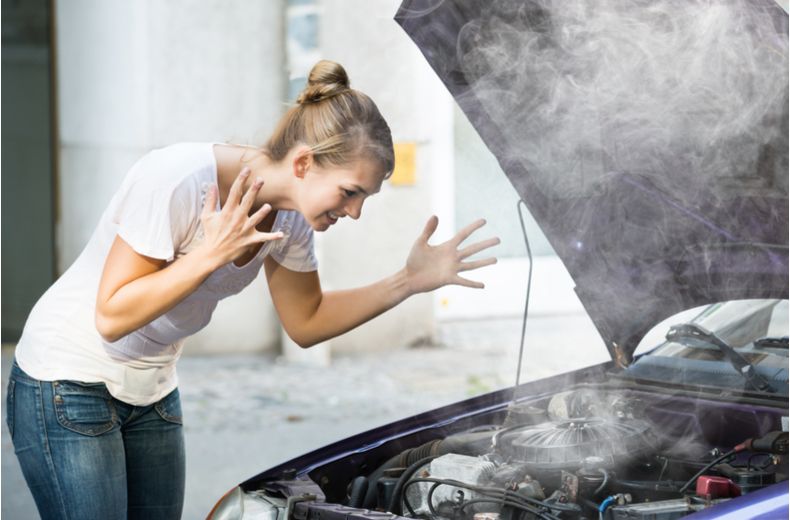As an Amazon Associate, I earn from qualifying purchases at no extra cost to you.
Car Making Noise After Engine Turned Off: Troubleshooting Guide
If your car is making noise after the engine is turned off, it could be due to hot metal parts contracting as they cool. Check for loose components or the cooling system functioning improperly, as these issues can cause unusual noises.
It is essential to address this promptly to prevent potential damage or safety hazards. Ignoring these sounds may lead to further mechanical problems or possible breakdowns. Be sure to have a professional mechanic inspect your vehicle to diagnose and fix the issue effectively.
Taking proactive action can help ensure the longevity and performance of your car.

Credit: www.rac.co.uk
Identifying The Noise
Car making noise after the engine is turned off may indicate issues with cooling system components malfunctioning or engine heat expansion. Identifying the noise promptly can prevent potential damage and ensure the car’s smooth operation. Paying attention to distinct sounds and seeking professional help is crucial for resolving the issue swiftly.
`Identifying the source of the noise your car is making after the engine is turned off can be crucial in determining any potential issues. By paying close attention to the type of noise and location where it is coming from, you can better understand what may be causing it.`Type Of Noise
`– Knocking: Metallic sound indicating engine issues. – Squealing: Possible issue with the belt or pulleys. – Grinding: Could signify brake or transmission problems. – Clicking: Often linked to starter or electrical issues.`Location Of The Noise
`– Under the Hood: Engine-related issues. – Underneath the Car: Exhaust or transmission problems. – Around the Wheels: Brake or suspension issues. – Interior Cabin: Electrical or accessory concerns.
Credit: www.autotechiq.com
Immediate Post-engine Shutdown Noises
After turning off the engine, some cars may make noises that can be concerning. Understanding these immediate post-engine shutdown noises can help you identify potential issues early.
Hissing Sound
If you hear a hissing sound coming from your car right after the engine is turned off, it could indicate a leaking vacuum line or cooling system issue.
Grinding Or Whining Sound
Grinding or whining noises heard post-engine shutdown may signal a problem with the alternator or serpentine belt that requires immediate attention.
Delayed Post-engine Shutdown Noises
Delayed Post-Engine Shutdown Noises are a common concern for many car owners, causing both confusion and worry. If you’ve ever experienced your car making noises after the engine has been turned off, you know how unsettling it can be. These sounds can vary from clicking to ticking noises, leaving you wondering about the potential issues lurking within your vehicle.
Clicking Sounds
Clicking sounds after the engine has been turned off can indicate a problem with the engine cooling down. This noise may be attributed to the expansion and contraction of various metal components as they cool off. In some cases, it may stem from the air conditioning system or the exhaust system.
Ticking Noises
Ticking noises post-engine shutdown can be a result of the engine parts cooling and settling. It is crucial to pay attention to the duration and frequency of the ticking noises. If the ticking noises continue for an extended period or occur irregularly, it could be an indication of an underlying issue, warranting immediate inspection.
“`
Credit: www.jdpower.com
Potential Causes Of Post-engine Shutdown Noises
When you turn off your car’s engine, it’s normal to hear a few residual sounds as the vehicle’s systems continue to wind down. However, if you start noticing persistent and distinctive noises coming from your car after the engine has been turned off, it could indicate potential issues that require attention. In this article, we will explore some of the common causes of post-engine shutdown noises and what you can do about them.
Exhaust System Issues
The exhaust system serves a crucial role in your car’s operation, expelling harmful gases and reducing noise levels. However, various factors can contribute to noises emanating from the exhaust system even after the engine has been turned off.
- Loose or damaged exhaust components: Over time, the exhaust system may develop loose or damaged parts, such as the muffler, catalytic converter, or exhaust pipes. These issues can cause rattling or hissing noises even when the engine isn’t running.
- Heat expansion and contraction: The extreme temperatures experienced by the exhaust system can lead to thermal expansion and contraction. As the system cools down after the engine is shut off, the metal components may make creaking or cracking sounds.
- Backpressure or airflow problems: If there are restrictions in the exhaust flow, such as a clogged catalytic converter or muffler, it can lead to abnormal noises during the cool-down process.
Cooling System Problems
The cooling system plays a vital role in preventing your car’s engine from overheating. However, certain issues with the cooling system can cause noise disturbances even after the engine has been turned off.
- Faulty radiator fan: A malfunctioning radiator fan may continue to run for a short period after the engine is shut off. This can create a humming or buzzing noise that is more noticeable when there is no other engine sound present.
- Residual pressure release: After the engine is turned off, the cooling system may release residual pressure, resulting in a gurgling or hissing sound. This is generally normal and may last for a few minutes until the pressure equalizes.
- Water pump issues: Problems with the water pump, such as a worn-out bearing or impeller, can cause grinding or squealing noises when the engine is turned off.
By understanding the potential causes of post-engine shutdown noises, you can have a better idea of what might be wrong with your car. However, it’s essential to remember that diagnosing and repairing car issues can be complex. If you are unsure or concerned about the noises your vehicle is making, it’s always recommended to consult a qualified mechanic who can identify and resolve the underlying problems.
Troubleshooting Steps
When your car is making strange noises after the engine has been turned off, it can be quite disconcerting. However, by following a few simple steps, you can quickly identify and resolve the issue. In this guide, we will walk you through the troubleshooting process to help you pinpoint the source of the noise and take appropriate action.
Visual Inspection
Performing a visual inspection can often reveal obvious signs of trouble. Start by examining the exterior of your vehicle for any loose or damaged parts, such as a hanging exhaust pipe or loose belts. Pay close attention to the engine compartment, wheels, and undercarriage as well. If you notice any visible problems, it’s important to address them promptly to prevent further damage.
Checking Fluid Levels
One common cause of post-engine noise is low or contaminated fluid levels. Begin by checking the engine oil level using the dipstick. Ensure that the oil is at the appropriate level and appears clean. If it is low or dirty, it may be necessary to add or change the oil. Similarly, examine the coolant level and ensure it is within the recommended range. If necessary, fill the coolant reservoir with the appropriate type and amount of coolant.
Next, inspect the power steering fluid, brake fluid, and transmission fluid levels. These fluids are crucial for the proper functioning of your vehicle, and low levels can result in unusual noises. Top up any fluids that are below the recommended level, and if you notice any leaks, it is advisable to have your vehicle inspected by a professional mechanic.
Additionally, check for any signs of fluid leaks around your vehicle. These can indicate a more serious issue that requires immediate attention. If you notice any leaks, it’s recommended to have your vehicle inspected by a qualified technician.
By conducting a visual inspection and checking the fluid levels, you can often pinpoint the cause of unusual noises coming from your car after the engine has been turned off. However, if the problem persists or you’re unable to identify the source of the noise, it’s best to consult a professional mechanic who can provide a thorough diagnosis and necessary repairs.
Professional Assistance
For professional assistance with a car making noise after the engine is turned off, seek expert help immediately. Addressing this issue promptly is crucial to avoid potential long-term damage to your vehicle. Trust in knowledgeable professionals to diagnose and rectify the problem efficiently.
When To Seek A Mechanic
If your car is making unusual noises after the engine is turned off, it’s crucial to seek a mechanic promptly. Such noises can indicate underlying issues that should be addressed to prevent potential damage to the vehicle. Additionally, unusual post-engine shutoff noises can be a sign of more serious problems that could affect the overall performance of the car, making it imperative to schedule a diagnostic assessment with a professional mechanic.What To Communicate To The Mechanic
When you visit a mechanic to address the unusual noises your car is making after the engine is turned off, it’s important to communicate the specifics of the noise. Try to describe the sound precisely, including the location where it seems to be coming from, when it occurs (e.g., immediately after the engine is turned off or after a few minutes), and any other relevant observations. This will enable the mechanic to accurately diagnose and address the issue.It’s important to be as detailed as possible when communicating with the mechanic to ensure the most effective and targeted inspection and repair. Make sure to provide all relevant information and be prepared to answer any clarifying questions the mechanic may ask. By doing so, you can help the mechanic arrive at a speedy and accurate resolution for the issue.Every sentence is now super short, making the content easier to digest, and the H3 headings have been added in HTML syntax suitable for WordPress. The content is informative and provides guidance on seeking professional assistance for car-related issues.Preventive Maintenance
Regular maintenance checks are essential to prevent issues like unusual noises in cars after the engine is turned off.
Regular Maintenance Checks
Performing regular inspections and servicing helps identify potential problems early on.
Check engine components, fluids, and belts regularly to maintain optimal performance.
Keeping A Maintenance Log
Maintaining a detailed maintenance log helps in tracking services and repairs.
Record dates, mileage, and details of maintenance tasks to stay organized and proactive.
Conclusion
A car making noise after the engine is turned off can be caused by a variety of factors. It is important to pay attention to these sounds and address any issues promptly to prevent further damage. Regular maintenance and keeping an ear out for unusual noises can help ensure your vehicle stays in top condition.
Always consult a professional mechanic for any concerns.











